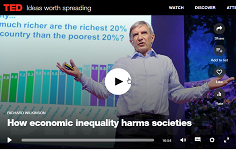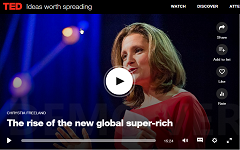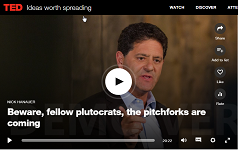Economic inequality is so important to a thorough look at happiness on and off the job that, before we leave the topic, I decided to provide an all-star lineup of TED talks on the subject, from a variety of perspectives. We’ve heard from the first two before, but not the last three.
This is Chrystia Freeland, journalist turned politician. We’ve heard a lot from her book Plutocrats already. Her political biases are evident in this talk.
Thomas Piketty, economist and professor at the Paris School of Economics, literally wrote the book on the subject — a 600-page runaway bestseller Capital in the Twenty-first Century. He talks fast enough to get through much of his book in this talk. I’ve quoted him before, too.
Paul Tudor Jones II is the billionaire founder of hedge fund Tudor Investment Corporation and a philanthropist. Here’s a sample:
“[Capitalism is] a system I love because of the successes and opportunities it’s afforded me and millions of others.
“Higher profit margins do not increase societal wealth. What they actually do is they exacerbate income inequality, and that’s not a good thing.
“This next chart, made by The Equality Trust, shows 21 countries from Austria to Japan to New Zealand. On the horizontal axis is income inequality. The further to the right you go, the greater the income inequality. On the vertical axis are nine social and health metrics. The more you go up that, the worse the problems are, and those metrics include life expectancy, teenage pregnancy, literacy, social mobility, just to name a few. Now, those of you in the audience who are Americans may wonder, well, where does the United States rank? … Yes, that’s us, with the greatest income inequality and the greatest social problems, according to those metrics.
“Now, capitalism has been responsible for every major innovation that’s made this world a more inspiring and wonderful place to live in. Capitalism has to be based on justice. It has to be, and now more than ever, with economic divisions growing wider every day.
“I’m not against progress. I want the driverless car and the jet pack just like everyone else. But I’m pleading for recognition that with increased wealth and profits has to come greater corporate social responsibility.
“‘If justice is removed,’ said Adam Smith, the father of capitalism, ‘the great, the immense fabric of human society must in a moment crumble into atoms.’”

Public health researcher Richard Wilkinson studies the social and health effects of income inequality. In his writing and in this talk, he offers piles of statistical evidence from worldwide studies on a wide variety of social issues including life expectancy, social mobility, math scores, literacy rates, infant mortality, homicide and incarceration rates, teenage pregnancies, levels of trust, obesity, mental illness, drug and alcohol addiction, mental illness, school bullying, violence, high school drop-out rates, and more. In this talk, he returns often to three points that seem to be commonly cited in inequality research and commentary:
- There is a strong statistical link between these social issues and economic inequality.
- Conventional economic measurements such as GNP per capita, gross national income, and national income per person fail to recognize this link; and
- The problem of inequality at its core revolves around relative inequality (the human trait of comparing what I have to what you have).
Nick Hanauer is another plutocrat — a “proud and unapologetic capitalist” — who has founded and funded 30+ companies across a range of industries, including aQuantive, which Microsoft bought for $6.4 billion. He openly loves his yacht and private jet, but fears for the future if economic inequality is left unaddressed:
“What do I see in our future today, you ask? I see pitchforks, as in angry mobs with pitchforks, because while people like us plutocrats are living beyond the dreams of avarice, the other 99 percent of our fellow citizens are falling farther and farther behind. In 1980, the top one percent of Americans shared about eight percent of national [income], while the bottom 50 percent of Americans shared 18 percent. Thirty years later, today, the top one percent shares over 20 percent of national [income], while the bottom 50 percent of Americans share 12 or 13. If the trend continues, the top one percent will share over 30 percent of national [income] in another 30 years, while the bottom 50 percent of Americans will share just six.
“You see, the problem isn’t that we have some inequality. Some inequality is necessary for a high-functioning capitalist democracy. The problem is that inequality is at historic highs today and it’s getting worse every day. And if wealth, power, and income continue to concentrate at the very tippy top, our society will change from a capitalist democracy to a neo-feudalist rentier society like 18th-century France. That was France before the revolution and the mobs with the pitchforks.
“Fellow plutocrats, I think it may be time for us to recommit to our country, to commit to a new kind of capitalism which is both more inclusive and more effective, a capitalism that will ensure that America’s economy remains the most dynamic and prosperous in the world. Let’s secure the future for ourselves, our children and their children. Or alternatively, we could do nothing, hide in our gated communities and private schools, enjoy our planes and yachts — they’re fun — and wait for the pitchforks.”
Next time we’ll look at the complex nature of real economics for real people in the real world.




